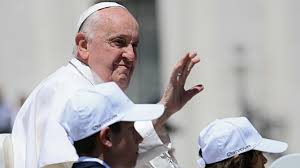The Pope’s use of a highly offensive term regarding homosexual men has resulted in an apology from the Vatican.
It stated in a statement that “Pope Francis is cognizant of the recent articles that have been published regarding a conversation that took place behind closed doors with the bishops of the CEI [the Italian Episcopal Conference of Catholic bishops].”
“He has stated on numerous occasions, ‘In the Church, there is room for everyone, for everyone!'” There is sufficient space for all, and no one is superfluous or pointless. As we are, each and every one of us.
“The Pope never intended to offend or express himself in homophobic terms, and he apologises to those who felt offended by the use of a term reported by others.”
In a private meeting with bishops, Pope Francis made the comment that priesthood colleges were already overrun with “frociaggine,” a highly offensive Italian term.
He is alleged to have reiterated his stance that homosexual men should not be permitted to become priests.
The remark was reportedly made on 20 May, as first reported by political rumors website Dagospia, during a private meeting between the Italian Bishops Conference and the Pope.
Il Messaggero, a national newspaper headquartered in Rome, reported that “it is entirely the responsibility of a bishop who violated his obligation to remain silent in order to disclose the error that transpired last week.”
During an informal Q&A session at the annual bishops’ meeting, which was attended by over 200 clergy members, the Pope made the comments, according to the publication.
The Pope has made linguistic errors in the past when speaking in a language other than his maternal tongue, and some have claimed that Spanish is his first language, rather than Italian, in an attempt to defend His Holiness.
According to reports, the 87-year-old Argentinian frequently engages in informal conversation, employs slang in his jokes, and even curses in private.
The Pope has been attributed with influencing the Roman Catholic Church to adopt a more inclusive stance toward the LGBT+ community.
“If a person is gay and seeks God and has good will, who am I to judge?” he stated at the outset of his papacy in 2013.
Last year, he permitted clerics to bless same-sex couples, which brought about a substantial conservative backlash.
Nevertheless, in 2018, he instructed Italian bishops to conduct a thorough examination of priesthood applicants and to reject any individual who was suspected of being homosexual.
The Vatican stated in a 2005 document that individuals who had successfully surmounted their homosexual tendencies for a minimum of three years could be admitted to the priesthood. This decision was made during the papacy of Benedict XVI.
However, the document also stated that individuals who “support the so-called gay culture” and have “deep-seated” homosexual tendencies should be excluded.
Analysis: The Vatican’s unprecedented apology
The Vatican has previously issued an apology.
However, they do not typically arrive at such a rapid pace. According to a Vatican observer, this is unprecedented.
However, this bore the hallmarks of having been reviewed by attorneys.
Initially, the statement is issued by the Holy See, rather than by Pope Francis.
Then there is the phrasing that we have all heard from politicians in the past: he apologizes to those who were wounded, rather than merely stating that he made a mistake. It lacks a sense of contrition.
Dispassionately describing the objectionable expression as “a term used by others” does not constitute denial. However, there is something remarkable about this, despite the caveats: an acknowledgment that this was a mistake that required rectifying.
And the Vatican is aware that this will be perceived as a tacit admission that the Pope did use this expression, a truly offensive slur that would be offensive enough if it were uttered by a foolish individual in a bar, but which was actually spoken by the leader of the Catholic Church.
Pope Francis was already confronted with concerns regarding his health and his capacity to maintain the unity of the church. Those inquiries may now be posed with a slightly increased volume.
